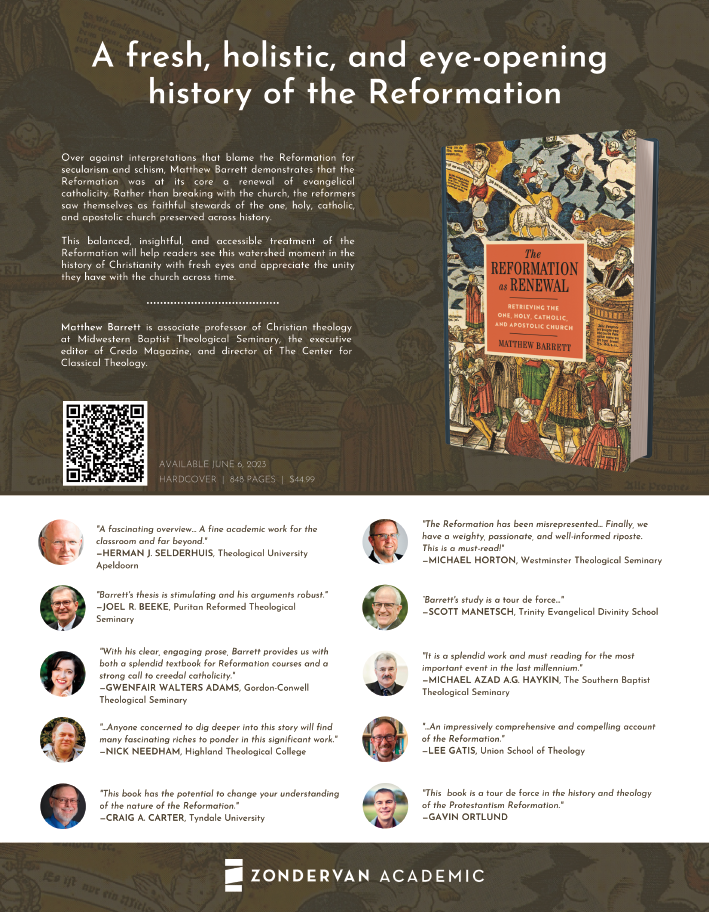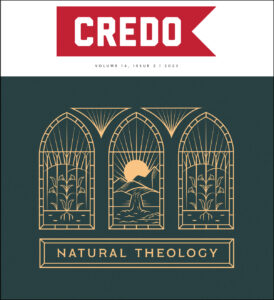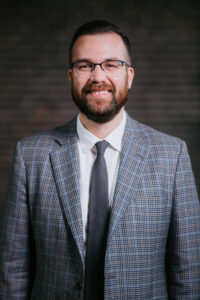
Natural Theology, Calvin, and Revisionism
The following is an excerpt from Matthew Barrett’s new book, T he Reformation as Renewal: Retrieving the One, Holy, Catholic, and Apostolic Church.
he Reformation as Renewal: Retrieving the One, Holy, Catholic, and Apostolic Church.
Historians have long observed that natural theology enjoyed a continual presence from the church fathers to the Scholastics, a fact that will be elaborated upon in the next chapter to explain a departure that occurs with late medieval theologians like Ockham. However, some Reformed thinkers in the twentieth century have concluded that the Reformers severely criticized or even abandoned the natural theology of their medieval predecessors, including natural theology’s metaphysical and epistemological structure. Calvin, more than most, has been turned into a foil for this argument, an argument that has spread in variegated forms from Karl Barth to Otto Weber to Cornelius Van Til. This oppositional narrative has even influenced the contemporary translation of Calvin’s Institutes. Calvin kept at bay Scripture citations in his opening chapters so that he could give proof of God’s existence, but McNeill and Battles have written into the text over forty biblical passages, which only serve to mask Calvin’s argument from natural theology.
History, however, disagrees with this revisionist interpretation. First, consider how Calvin, in his Institutes, situated knowledge of the Creator within a participation paradigm. Appealing to the goodness of God’s providence, Calvin did not believe the creature will understand what honor we owe to God if he does not comprehend that God is the source, the fountain of all goodness. For “not only does he sustain this universe (as he once founded it) by his boundless might, regulate it by his wisdom, preserve it by his goodness, and especially rule mankind by his righteous- ness and judgment, bear with it in his mercy, watch over it by his protection; but also that no drop will be found either of wisdom and light, or of righteousness or power or rectitude, or of genuine truth, which does not flow from him, and of which he is not the cause.” God’s sustaining care, in other words, is evidence that he is the cause of all goodness humanity enjoys. “Again, you cannot behold him clearly unless you acknowledge him to be the fountainhead and source of every good.”
Second, as the pinnacle of the created order, those made in the likeness of God exhibit natural revelation’s presence within themselves. Each person has a “natural instinct, an awareness of divinity,” including “more backward folk and those more remote from civilization.” Cicero, the “eminent pagan” as Calvin called him, is a case in point. As Calvin said, there is “no nation so barbarous, no people so savage, that they have not a deep-seated conviction that there is a God.”The natural order is a reflection in which we see the image in which we were created. Click To Tweet
Recent revisionists claim Calvin denies that man after the fall can derive a knowledge of God from creation. Calvin had strong words for humanity’s sup- pression of this knowledge (he does not hesitate to use the language of idolatry). However, the fall never moved Calvin to be so extreme as to deny that pagans like Cicero can recognize a “deep-seated conviction that there is a God.” For example, Paul writes to the Romans and says, “For his invisible attributes, namely, his eter- nal power and divine nature, have been clearly perceived, ever since the creation of the world, in the things that have been made. So they are without excuse. For although they knew God, they did not honor him as God or give thanks to him, but they became futile in their thinking, and their foolish hearts were darkened” (1:20–21). Calvin interpreted Paul’s phrase “they knew God” as follows: God “declares here, quite obviously, that God made a knowledge of his majesty flow down into the spirits of all men: which is to say that he has shown himself so much, by his works, that they are forced to see that which they do not seek by themselves, that is, that there is a God.” In other words, culpability assumes they do possess a natural knowledge of God’s existence by means of God’s natural revelation. “If natural theology were impossible [for Calvin],” clarifies Richard Muller, then “idolatrous man would not be left without excuse.”
 In fact, even when Calvin echoed Paul (in Rom. 1:23) and said fallen man has exchanged the immortal God for an image or an idol resembling mortal man, he thought such distortion proof from the created order itself that man was made to worship God. Man “prefers to worship wood and stone rather than to be thought of as having no God,” and “clearly this is a most vivid impression of a divine being.” Therefore, however strenuous the resistance to the true God may be, no person is capable of escaping the knowledge of God in the created order that he must assume in the first place to be an idolater. For even “the boldest despiser of God is of all men the most startled at the rustle of a falling leaf,” explains Calvin. “Whence does this arise but from the vengeance of divine majesty, which strikes their consciences all the more violently the more they try to flee from it?”
In fact, even when Calvin echoed Paul (in Rom. 1:23) and said fallen man has exchanged the immortal God for an image or an idol resembling mortal man, he thought such distortion proof from the created order itself that man was made to worship God. Man “prefers to worship wood and stone rather than to be thought of as having no God,” and “clearly this is a most vivid impression of a divine being.” Therefore, however strenuous the resistance to the true God may be, no person is capable of escaping the knowledge of God in the created order that he must assume in the first place to be an idolater. For even “the boldest despiser of God is of all men the most startled at the rustle of a falling leaf,” explains Calvin. “Whence does this arise but from the vengeance of divine majesty, which strikes their consciences all the more violently the more they try to flee from it?”
Calvin’s affirmation of the universal, natural knowledge of God leads him to affirm a sensus divinitatis that cannot be eradicated no matter how hard fallen man tries. “Men of sound judgment will always be sure that a sense of divinity which can never be effaced is engraved upon men’s minds.” Again, even pagan philosophers understood and embraced the sense of divinity and considered it indispensable to natural theology. Calvin found an ally in Plato’s philosophy for example: “Plato meant nothing but this when he often taught that the highest good of the soul is likeness to God, where, when the soul has grasped the knowledge of God, it is wholly transformed into his likeness.”
A natural knowledge of God not only sits within the creature but stands before his eyes in the creation as well. The seed of religion is sown in the mind but also revealed daily “in the whole workmanship of the universe.” The creation is a theater of God’s glory. Granted, no one can see God’s essence and live. For God is incomprehensible. Yet God has accommodated himself by means of his works. God’s works in creation and providence, for example, are the proper medium for knowing he exists, a point no different from Thomas and Augustine.
We know the most perfect way of seeking God, and the most suitable order, is not for us to attempt with bold curiosity to penetrate to the investigation of his essence, which we ought more to adore than meticulously to search out, but for us to contemplate him in his works whereby he renders himself near and familiar to us, and in some manner communicates himself. . . . As Augustine teaches elsewhere, because, disheartened by his greatness, we cannot grasp him, we ought to gaze upon his works, that we may be restored by his goodness.
Therefore, the natural order is a reflection in which we see the image in which we were created. “The reason why the author of The Letter to the Hebrews elegantly calls the universe the appearance of things invisible is that this skillful ordering of the universe is for us a sort of mirror in which we can contemplate God, who is otherwise invisible.
Calvin’s affirmation of natural revelation and with it, natural theology—from Plato to Augustine—never denies the need for what Calvin called the spectacles of faith. Calvin placed no little emphasis on natural theology’s intrinsic parameter (a revelation of God’s existence and perfections but not articles of faith, such as the Trinity) and extrinsic parameter (man’s rebellion). However, those parameters did not lead Calvin to deny the legitimacy of natural theology altogether, only to understand its contribution within proper limits. Due to these parameters the light of nature requires the light of God’s Word for salvation, but that does not eliminate the light of nature’s instrumentality for a knowledge of God’s existence, perfections, and divine providence in creation. For God is the author of two books, the book of nature and the book of Scripture, and Calvin does not hesitate to appeal to the former to develop a natural theological argument, even if he does not use the grammar of “natural theology” like his heirs in the decades and centuries that followed.
To clarify, the continuity between Calvin and the patristic and medieval practitioners of natural theology does not mean Calvin merely republished their arguments in his own idiom. And yet, continuity with his patristic and medieval predecessors persists because Calvin (1) not only utilized natural theology but (2) wielded a posteriori arguments, as is plain in his use of natural theological arguments from Cicero and the Stoics. For example, J. V. Fesko observes the way Calvin appealed to the Greek conception of natural law (preconception; prolepsis) to explain why the Gentiles do what the law requires by nature (Rom. 2:14). In addition, Calvin’s approach to natural theology in his Romans commentary is similar to his Institutes where he mentioned the philosophers and modeled their strategy, namely, an argument that moved from the beauty of the body to its Maker, a method that was conspicuous in Cicero and Aristotle alike.
Despite these continuities between Calvin and the Augustinian tradition, Calvin’s view does differ in this sense: creation makes it plain that God is but the sinner twists who God is. “Human reason perceives that God exists,” but nonetheless “misperceives what God is like.” Blindness can only be remedied through saving faith which sees God with new eyes through the spectacles of Scripture. While agreeing with Calvin that sin distorts this natural knowledge, most other Reformers said more about the content of natural knowledge: not only does natural knowledge perceive that God is but who God is (e.g., perfections and providence).
In the judgment of Calvin’s contemporaries, Paul does not stress an acute noetic impairment because of sin or distinguish sharply between what is revealed in nature and what is perceived by fallen human reason. The thrust of Paul’s argu- ment, indeed, runs in the opposite direction. The point that Paul makes is not how little the Gentiles knew, but, considering the circumstances, how much they did know and how little use they made of it.
Steinmetz enlists a litany of Reformers who diverge from Calvin in their reading of Romans 1—from Luther to Melanchthon, from Bucer to Bullinger, from Zwingli to Oecolampadius, from Musculus to Vermigli, and many more. A survey of Reformed Orthodoxy in the sixteenth through eighteenth centuries produces similar results on the whole (Leigh, Turretin, Owen, Witsius, etc.). The Reformation and its heirs did practice natural theology and in a way that put them, by their own admission, in “broad continuity” with the church catholic. Click To TweetCalvin and the Reformed alike affirmed natural knowledge and its distortion by sin, but whereas Calvin thought natural knowledge of God’s nature was misperceived, other Reformers and many of the Reformed Orthodox thought this knowledge may be perceived, for they cannot misconstrue what they do not perceive. To be clear, that difference did not mean the Early and High Reformed Orthodox then concluded that natural theology was the basis of supernatural theology, as scholars like Weber have assumed. Rather, natural theology was instrumental, with reason remaining a handmaid to the revelation of the Word.
The Reformed Scholastics of the late sixteenth and seventeenth centuries operated in continuity with the Reformers even if it was more necessary to treat natural theology at greater length to write confessions and systems of theology to codify Reformed theology. The Belgic Confession of 1561, Francis Junius’s A Treatise on True Theology in 1594, Johann Heinrich Alsted’s Theologia Naturalis at the start of the seventeenth century, the Westminster Confession in 1647, Francis Turretin’s Institutes of the seventeenth century—these are only a few examples that manifest Reformed Scholasticism’s steady testimony to natural theology, much in line with the Augustinian-Thomist tradition. Many of these theologians and confessions appealed to texts like Psalms 19:1–6 and 89:1–13; Job 38; Romans 1:19–25 and 2:14–15; and Acts 14:15–17 and 17:22–33 to accentuate Scripture’s own confirmation of natural revelation and with it a justification of natural theology.
In summary, the Reformation and its heirs did practice natural theology and in a way that put them, by their own admission, in “broad continuity” with the church catholic.

